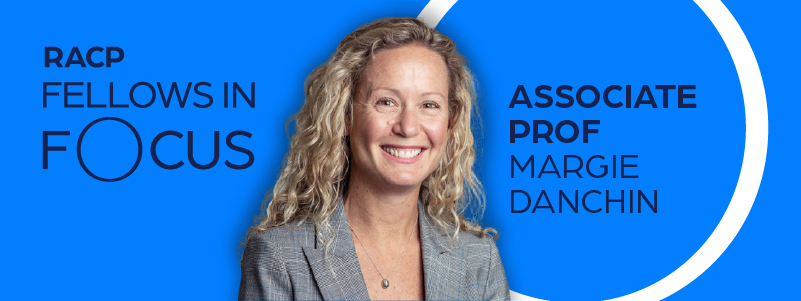RACP Fellows in Focus: A/Prof Margie Danchin
Date published:
26 Apr 2021

Your Facebook feed is probably populated with a few posts about it, you may have seen a YouTube video about it or maybe you’ve had a conversation about it with a friend. Whatever your exposure, you probably have an opinion on vaccination and anti-vaccination. However, there is one woman that knows all about the subject and that woman is, Associate Professor Margie Danchin.
Margie is consultant paediatrician within the Department of Paediatrics, University of Melbourne and Murdoch Children’s Research Institute (MCRI). She is Group Leader, Vaccine Uptake at MCRI, and is an immunisation expert with over ten years of experience in vaccine research and clinical work, both in Australia and in resource-poor settings. She has expertise in vaccine clinical trials, vaccine safety, program evaluation, health system strengthening and implementation research in low resource settings, social science and vaccine policy. Her research program focuses on improving vaccine confidence, demand and uptake of licensed vaccines in different settings and populations.
Margie strives to be an effective communicator. A necessary skill to have when taking on the bullets fired from the vaccination and anti-vaccination camps. “In my weekly immunisation clinic at the Royal Children's Hospital I speak to people with concerns about vaccines or those who refuse them outright. I really try to take the time to listen, to acknowledge their concerns and not judge them. In paediatrics, communication is central to all that we do – with parents, kids and the extended family – and offers the opportunity to communicate in a warm and generous way. It's a less formal specialty than adult medicine”.
In spite of her training and a large toolbox of methods at her disposal, the career path Margie finds herself trailblazing on is not without its challenges. She recounts, “About five years ago, I decided to shift from vaccine clinical trials and vaccine safety to focus my research on vaccine confidence and on understanding and addressing the reasons for low vaccine uptake, which is becoming increasingly important, especially as misinformation spreads through social media. I really wanted to try to understand how people think and feel about vaccination and what processes underpin vaccine acceptance to improve vaccine uptake. My work includes the development and testing of social and behavioural interventions to improve vaccine confidence and uptake across different vaccines, during critical vaccine decision-making timepoints, such as pregnancy, infancy and early childhood, during the school years and adulthood, and in different populations and settings. What’s exciting is that this field has enabled me to work with researchers across many disciplines including political scientists, vaccine communication experts, social scientists, infectious diseases and the media. I have also had the opportunity to work with WHO and other leading global public health agencies to start to look for solutions to under-vaccination globally. It's been fantastic and a real shift in gear away from what I was doing previously.”
A transition like this didn’t go unnoticed by her peers, “Some of my colleagues have been surprised that I shifted my focus to the social and behavioural sciences, but it's been an extraordinary journey and the best thing I've done. I feel the work is so impactful from a public health perspective. The pandemic has really highlighted that everything is about trust and that innovation is now needed in behavioural science to understand how people and communities process information and public health advice and build trust. Countering anti-vaccination activity, misinformation and strategies to improve vaccine uptake, not only in Australia but globally, is just as important as developing and testing new vaccines. After all, it is vaccination that saves lives, not vaccines.”
Speaking with parents on a weekly basis about their vaccine concerns for giving vaccines to their children has helped to shape Margie’s research program. “I really wanted to try and humanise the process of discussing vaccine concerns with people, under-pinned by the best evidence in vaccine communication science and focus on what actually constitutes effective vaccine communication. We’ve developed multi-component intervention packages for primary care and maternity providers that are designed to overcome the practical barriers to immunisation as well as provide training for providers and education for parents, young people and providers. We have developed resources, websites, videos and blogs to try and address all the known barriers on the road to vaccination and to positively influence people to help them to choose vaccination without feeling judged.”
Margie has a few words to offer if considering a career-path such as her own, “Juggling many balls in the air is an ongoing challenge. Serendipity has played a huge part in my career. Taking opportunities when they arise is really important, but so is learning to accept that failure is part of the life of a clinician scientist. People’s careers might sound glossy, but for almost all, there has been a lot of failure and rejection along the way. Of grants, of fellowships, of papers. Being open to accepting failure and celebrating the wins well is something I really try to do and to teach those within my team. And probably the most important thing is to collaborate, share ideas and try to be generous, as many of my mentors have taught me.”
“I would like to be seen as a woman clinician scientist that really had an impact in this space. I might be one of a handful of people in this space, but I'm certainly not going to be the last. As Kamala Harris, the current Vice President of the United States of America, said, I really want to make sure that I can open the door for those coming in behind me and that I can lift others up, especially women. If I could do that, that would be a wonderful legacy.”